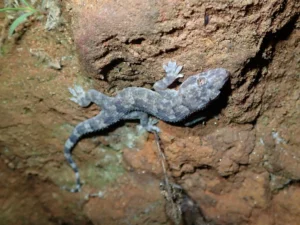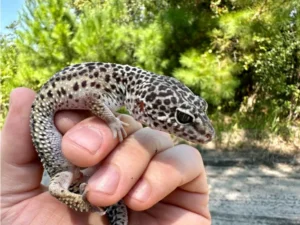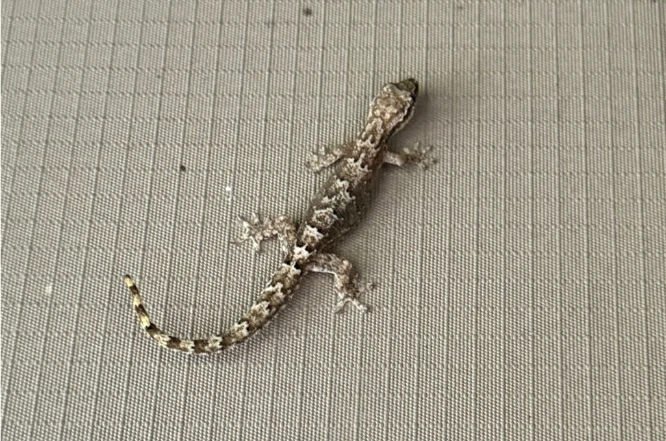If you’ve ever had a gecko in your home or heard strange sounds at night, you might be wondering if those little lizards are actually making noise.
Most reptiles are quiet, but geckos are different. They run along walls and ceilings, and sometimes you’ll hear clicking or chirping sounds. So, do geckos make noise?
Yes, geckos make noise. Unlike most lizards, many gecko species are vocal and can produce sounds like chirps, clicks, barks, and squeaks. They use these sounds to communicate with other geckos, defend their territory, attract mates, and sometimes to show fear or stress.
Geckos are one of the few lizards that really use sound, and that makes them really interesting to watch and listen to.
Why Geckos Make Sounds
Geckos make noises for different reasons, kind of like birds or other animals that talk with sounds.
The main reason is to communicate with other geckos. Male geckos call to claim a space and warn other males to stay away.
So when you hear a gecko making noise at night, it’s usually a male saying “this is my spot.”

Geckos also call to attract mates. During breeding season, males will call out to females to let them know they’re around.
Some species, like house geckos and tokay geckos, can be really loud and keep going for a long time.
Sometimes geckos make noise when they’re scared or feel threatened. If you pick one up and it starts squeaking or chirping, it’s trying to scare you into letting it go. It’s a little trick that sometimes works on predators.
Even baby geckos make sounds to talk to their mother or siblings, especially right after hatching. These noises help them stay together and signal when they need help.
What Do Geckos Sound Like?
Different gecko species make different sounds, and even the same species can make several types of calls.
House geckos, which are common in homes, make clicking and chirping sounds. These are short, repeated clicks that almost sound like birds.
The sounds can change depending on what the gecko is trying to say.
Tokay geckos are famous for their loud, unique calls. They make a “to-kay” or “gecko” sound, which is actually how they got their name.
These calls are loud enough to wake you up if they live nearby.

Leopard geckos, which are popular pets, make softer sounds. They chirp, squeak, and sometimes rattle their tails when they feel threatened.
Their calls are much quieter than house geckos or tokay geckos.
Crested geckos make soft chirps that almost sound like quiet whistles. They’re not as vocal as other species, but you can hear them if you’re paying attention, especially at night.
Some geckos even bark. The barking gecko, from Africa, gets its name from the dog-like bark it makes. It’s surprisingly loud for such a small animal.
When Are Geckos Most Vocal?
Geckos are most active and vocal at night because they’re nocturnal.
During the day, they usually hide and rest quietly. But when the sun goes down, they wake up to hunt for food. That’s also when they make the most noise.
You’ll hear gecko calls a lot during breeding season. Males get very territorial and call out constantly to claim their space and attract females.
In tropical areas, you might hear them all night, especially in the warmer months when they’re most active.
Geckos also make noise when they come across each other unexpectedly. Two males might start calling aggressively before one backs down or a fight starts.
When geckos are stressed, sick, or being handled, they might make high-pitched distress calls. These sounds are usually more frantic than normal calls.
Do All Geckos Make Noise?
Not all geckos are equally vocal. Some are almost completely silent.
The loudest geckos are house geckos, tokay geckos, and Mediterranean geckos. They use sounds as a big part of how they communicate.
Leopard geckos and crested geckos make sounds too, but they’re much quieter. You have to be in a quiet room to hear them.
They don’t call constantly like house geckos.

Some species barely make any sound. Day geckos, for example, are mostly silent. They might make very soft noises sometimes, but you probably wouldn’t notice unless you were really listening.
A gecko’s size doesn’t always decide how loud it is. Some small geckos are surprisingly loud, while some bigger ones are quiet.
Are Gecko Sounds Annoying?
Whether geckos are annoying depends on the species and how sensitive you are to noise.
House geckos and tokay geckos can be loud, especially at night. Some people find the constant clicking or “to-kay” calls disruptive, while others get used to it after a while.
In many tropical countries, gecko sounds are just part of normal nighttime noise
. People grow up hearing them and don’t think much about it. It’s like crickets outside; some people sleep fine, others can’t.
Pet geckos like leopard geckos and crested geckos are usually quiet enough that they won’t bother you.
Their calls are soft and rare, so they’re unlikely to disturb your sleep or daily life.
If the noise bothers you, remember it’s mostly during breeding season. After that, it drops. Also, geckos help eat insects, so a little noise might be worth it.
How Geckos Make Sound
Geckos don’t have vocal cords like mammals, but they still make sounds.
They push air through their throat, which makes parts in there vibrate and produce sound. They don’t have real vocal cords, but these parts work similarly.

Some geckos click their tongue against the roof of their mouth to make noises. It’s like how you click your tongue, but they do it much faster.
Other sounds come from their throat. When they push air while tensing muscles, it makes barks, squeaks, and calls.
The exact way they make sounds depends on the species. Tokay geckos have more developed parts for making sound than leopard geckos, which is why they can make louder and more complex calls.
Can You Make Geckos Stop Making Noise?
If geckos are keeping you awake, you might wonder if there’s a way to quiet them.
The short answer is you can’t train geckos to be quiet. They make noise naturally to communicate, and they won’t understand that you want them to stop.
If geckos are outside, you can close windows or use white noise to cover the sounds. A fan or white noise machine helps.
If geckos are inside, you can catch them gently and put them outside. But if your home has insects, more geckos might come in to hunt.
The long-term solution is to make your home less appealing to geckos by reducing insects. Fewer insects mean fewer geckos and less noise. Keep your home clean, seal entry points, and consider insect repellents.
Some people like having geckos around even if they’re noisy because they help control bugs. I
t’s a trade-off between hearing chirps at night and having fewer mosquitoes and pests.
What Gecko Sounds Mean
Understanding gecko sounds can help you know what’s going on.
Short, repeated clicks usually mean the gecko is marking its space or just doing its normal night activities.

Loud, harsh calls usually mean two geckos are having a territorial dispute. Males especially will call aggressively at each other.
Soft, steady calls are often mating calls. A male is probably trying to attract a female if you hear regular patterns.
High-pitched squeaks or frantic chirps mean the gecko is scared or in danger. If you hear this and see a gecko, it might feel threatened or stuck.
Tail rattling with chirping is a warning from species like leopard geckos. It means the gecko feels threatened and is ready to defend itself if needed.
Conclusion
Geckos do make noise, and they’re one of the few lizards that really use sound. They chirp, click, bark, and squeak to talk to each other and react to their environment.
The sounds help them mark territory, attract mates, and warn off danger. Some species can be very loud at night, but most people get used to it.
If you have geckos in or around your home, their calls are just part of how they live. Some people find it annoying, others appreciate it because geckos help control insects.
Knowing why geckos make noise helps you understand these little lizards better and maybe even enjoy listening to them a bit.
Hi, my name is Ezra Mushala, i have been interested animals all my life. I am the main author and editor here at snakeinformer.com.

